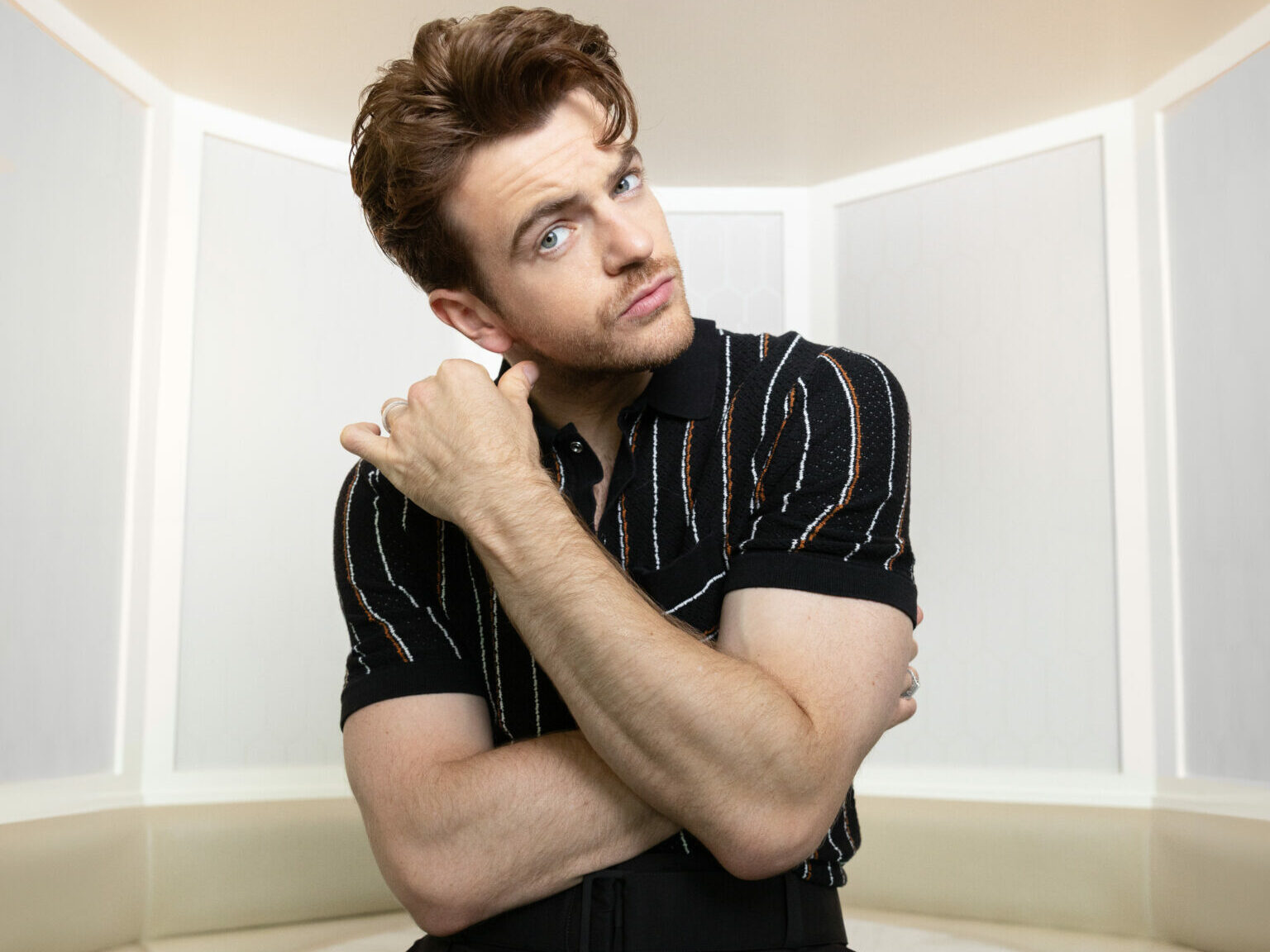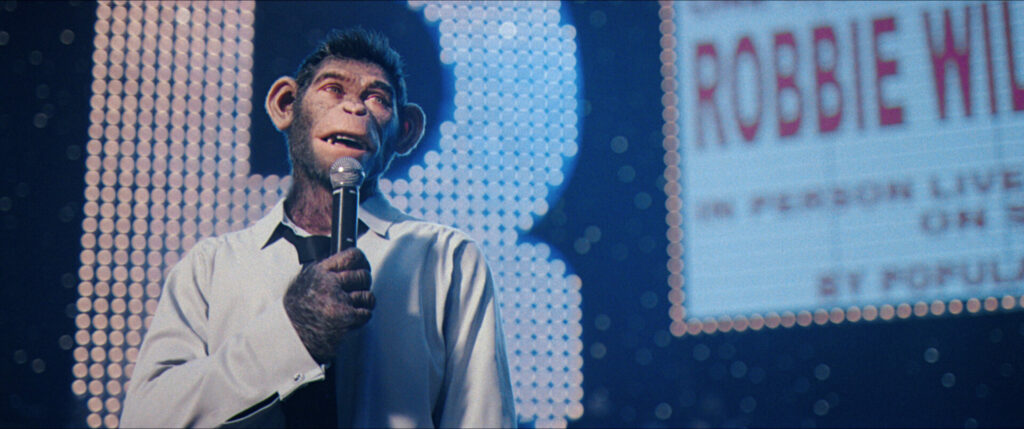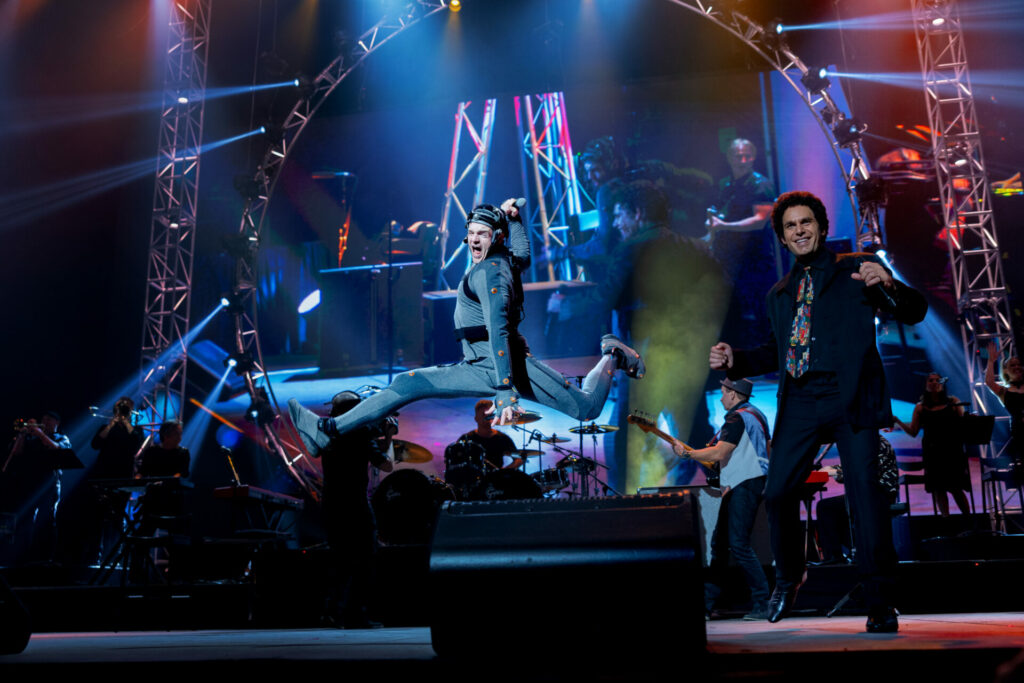Primal Instinct: Jonno Davies on portraying Robbie Williams in ‘Better Man’
In ‘Better Man’, Robbie Williams' life story is told through an unlikely lens – that of a chimpanzee. Meet Jonno Davies, the man tasked with bringing primate Robbie to the big screen.
By Nick Reilly

When Jonno Davies was cast as Robbie Williams a mere five days before cameras began rolling on Better Man, the rising British star immediately knew that his first leading role on the silver screen would be quite unlike any other. Becoming a household name and having your face plastered on billboards tends to be less of a worry when you’re portraying a British icon as an actual walking, talking monkey.
And yet, this is the barmy premise that forms the heart of a blisteringly original biopic from The Greatest Showman director Michael Gracey, which takes tired tropes and spins them on their head. In it, the winner of The Film Award at the Rolling Stone UK Awards 2024, you’ll see a monkey racking up countless lines of cocaine, but you’ll also see said monkey leading a dancing troupe down Regent Street to the strains of ‘Rock DJ’.
“It’s been a blessing and a curse,” says Davies, reflecting on the part when we meet in a London hotel in late autumn. “I just got to be genuinely me and focus on the why of the role rather than the how, and that was beautiful.”
It helps too that this primate-based version of Robbie was brought to life by Wētā FX, the technical whizzes who pioneered the motion capture technology that was used on films such as Avatar and, most notably, on Lord of the Rings. Unexpectedly, there’s even shades of the latter film late on in Better Man, when Robbie’s Knebworth performance descends into a broken-bottle and fist-fuelled battle that gives Helm’s Deep a run for its money.
For Davies, there’s a fortuitous full-circle moment to it all too. Before landing this role, he had been seen in supporting roles in shows such as Amazon’s Nazi-slaying series Hunters, but the cut-throat nature of the industry meant that he would often deliver entertainment gigs at parties to make ends meet. He’d play a variety of characters including Marvel’s The Hulk, Captain America and, most interestingly, The Greatest Showman’s PT Barnum.
“I literally did a Greatest Showman party a month before I got the film, wearing the red coat and coattails and it was a great job — it meant I didn’t have to do a bar job,” he reflects. “But somehow, I ended up working with the director of that very film and it came at a time where I wanted to act so much. I was given this role where you’re allowed to perform and it’s about being truthful to this huge character that is Robbie Williams.” Here, Davies talks in more detail about his part in the film.
I spoke to Robbie in 2022 and he said it was a “blood and guts” biopic. Having now seen it, it’s exactly clear what he meant. It really doesn’t hold back, does it?
It’s warts and all, and I think that’s what makes it really special. I think that’s credit to Rob, really, that he’s allowed that side of him to be seen in such an honest way. I think he could have easily said no and painted himself in a much more favourable light. But, you know, as well as being the hero, he’s also the villain of our film. I think that’s what makes it so watchable because it’s so unpredictable. You don’t know what he’s going to do.
Were you a fan before you took the gig, or an observer of Robbie from afar?
I saw him with my mum and dad at Milton Keynes Bowl when I was a kid, and he was in his classic black vest and jeans. He was just this rock star, you know, and I thought it was amazing. I think it was one of my first ever concerts, and an outdoor one is different too. I think there’s something even more raw and aggressive about it. I’m a massive fan, and ‘Angels’ was my karaoke song.
He was probably one of the reasons why I wanted to be a singer when I was younger, because I had a failed audition for X Factor when I was 14 or 15. That ended that dream, so I thought I’d go back to acting!
How did you react when Michael Gracey told you that Robbie’s story would be told through the guise of a walking, talking monkey?
I was definitely bewildered, because you go “Oh? You’re telling a story that a lot of people know, but you’re making him a monkey?” From the base of it, I didn’t understand, but then I saw the pre-vis and I started to understand it artistically, what it allowed them to do with the musical numbers and take them into a fantasy land. It’s a great way of representing something when words just aren’t enough — like any good musical.
The more I spoke to Michael too, I had this realisation that the monkey is the idea of the audience seeing Rob the way he sees himself, that reflective viewpoint and the idea of being a performing monkey, which is rife in celebrity culture at the moment. People see the celebrity and although we have this strange access to their lives, we’re still disconnected from them and we’re not empathetic. We can often think, ‘You might have mental health issues, but you’re rich and you have a million followers on Instagram.’ I think Michael wanted to bridge that gap; he wanted people to feel what Rob was feeling.

Did you get the chance to properly inhabit that mindset then?
Well, I was actually brought to the movie about five days before it started shooting. I was the last person to come onboard because they had a really hard time finding Robbie, and Kate Mulvaney, who plays my mum in the film, recommended me to Michael. We’d been in Hunters on Amazon Prime, and we never did any scenes together, but she showed Michael my theatre work, including A Clockwork Orange, where I played Alex DeLarge. Our version of that was very physical theatre and a lot of bravado. It was a very different project in one sense, but there’s almost a shared thread too. Michael saw that and thought there was something worth exploring. But in the end, I was flown out to Australia where it filmed without knowing if I had the role. That was the most nervous flight of my life…
You flew out without knowing if you had the role?!
Yeah, but I thought this had to be a good sign. ‘They’re not flying me out there with the intention of saying no, but they still haven’t offered it to me. Am I packing my clothes for three months or am I packing my clothes for three days?’ And ultimately, I decided to go with the latter because I thought the heartache would be too much if I’d unpacked all my stuff and then was told I was going home. What was amazing about that though is that Michael told me directly I’d got the job. Often when you do these things, it goes down the chain to your agent and to you. That’s lovely, but it’s great to hear it straight from the horse’s mouth when you’ve done an amazing day of auditions and danced with the boys who played Take That. But it was a life-changing moment. There was certainly relief but also an overwhelming feeling of ‘Oh, God, I’ve actually got to do this now.’
Do you see yourself and Rob as kindred spirits? What was it like meeting him for the first time?
I can certainly feel connected to him and even more so since meeting him. I see now what a family-orientated man he is and what a genuine and generous man he is. But the first time I met him, I had a camera attached to my head, [I was] wearing the CGI pyjamas, and it was in Melbourne on this huge sound stage that had been created specifically for the film. We were about to run through ‘My Way’, and I don’t sing in the film, but I had to sing for filming so it looked like that was the case when they added the vocals. Suddenly, the door gets kicked open, and in Mr R Dubz strolls in, plonks himself in the front row, and it felt like he was saying, “Let’s see what you’ve got.” I shat myself! I thought I’d butchered it, but we really connected from that point.
How open was he about his experience of addiction and his mental health?
He is very open about his addiction, and even now I think it helps him to be that way. He’s also obviously very lucky to have a wife and a family that really do care for him now. They want for him rather than want from him.
But he was open, he said he still would have probably been an addict without fame. He’s just got a much easier access to [drugs]. And I think he would have still spiralled into really dark worlds of depression and self-hatred, even without the drugs.
But again, it just accelerates it. And what he told me was when he realised that he could not say no, that’s when he realised how bad things were. When it was the end of the night and there was only one way it was going.

What was Robbie’s first reaction to the film?
I think he was extremely grateful to Michael for doing such a good job. Because as an artist I imagine you go, ‘I’ve given up so much of myself here. What if it’s not very good? You know, I can’t take that back.’
He was grateful for the audience reaction at Telluride Film Festival, where we premiered it, too. That might sound narcissistic, but it’s not; it’s that constant worry that you’re not enough. So, for people to see those sides of them and yet still give it a standing ovation and say, “Wow, you’re a fucking rock star,” I think was really humbling.
Going back to what you said earlier about celebrity culture, do you think the film could take on a deeper meaning with the audience in the wake of Liam Payne’s death?
Yeah, totally, and I think people sometimes say that drugs are a common trope of biopics. But there’s a reason why this happens, and you do see it a lot. It’s the pressure-cooker environment of it all, and I think that’s only going to get worse. Imagine if Robbie had been at his dark stage during social media? God knows what would [have happened].
But I’d hope that this film might change the way people perceive celebrities. Even just a per cent or two, because I think what Michael’s done really well is shine a light on the man behind the fame and what people go through when they are famous. The armour they have to put on in order to just survive. So, I hope people can come away with an increased sense of empathy.
What impact do you think this film could have on your career?
It just came at a perfect time for me because Hunters had come out just before Covid, and I had my visa for America ready to go. I didn’t have my son at that point, so I was able to be a bit more of a free-flowing bird.
But after Covid, when me and my wife started talking about a family, it makes you realise that acting isn’t just about chasing a dream, it has to be about chasing an income. I was a kids’ entertainer for so long, all the way from when I left drama school to getting Better Man. I was Hulk, Jack Frost and I literally did a Greatest Showman party a month before I got the film, wearing the red coat and coattails and it was a great job — it meant I didn’t have to do a bar job. But somehow, I ended up working with the director of that very film and it came at a time where I wanted to act so much. I was given this role where you’re allowed to perform and it’s about being truthful to this huge character that is Robbie Williams.
I’ll always be thankful to Kate Mulvaney for recommending me after we worked on Hunters, and my team and my wife just had faith in me and they believed that it would come. So yeah, I’ll always be very grateful for this, I think, no matter what happens [in] the rest of my career.
Taken from the December/January issue of Rolling Stone UK – you can buy it here.
- Better Man is released in UK and Irish cinemas on 26th December 2024
